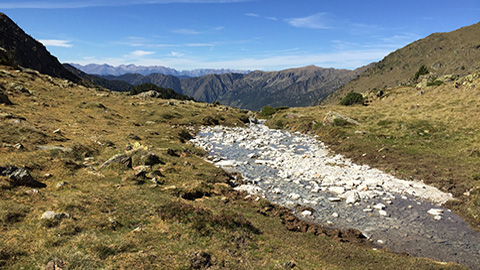The UAB and the UdG to study the natural acidification of high altitude rivers in the Pyrenees

Researchers from the UAB and the University of Girona (UdG) are leading the AMiCC project (Acidification of high altitude water masses and its relation to climate change, toxicity and implications for Biodiversity), whose objective is to study the natural, metal-enriched acids draining into the soil and affecting protected high altitude areas of the Pyrenees. The project receives the support of the Spanish Ministry for Ecological Transition's Fundación Biodiversidad.
23/01/2019
In the past decade, scientists have detected a hydrochemical alteration affecting the head of mountain rivers located in several protected areas of the eastern and western Pyrenees. This alteration manifests itself as the fall of whitish compounds in the form of patinas which cover the riverbeds of some rivers and are enriched with heavy metals such as aluminium, magnesium and nickel. This acidification phenomenon, which had been barely detected before, has heightened greatly in the past few years.
Recent observations suggest that rainfall processes are related to acid drainage of a natural origin, generated in mineralised mountain massifs which due to oxidation increase the acidity of the water and cause an increase in metals and metalloids. These observations also point to the fact that the acid drainages observed recently could have been triggered by new warmer and drier conditions produced by climate change. Nevertheless, the lack of precedents, difficult access to the affected areas located at 2000 to 2500 metres of altitude, and the scarce data available on the quality of mountain water masses, contribute to a very limited amount of information on this phenomenon and its evolution.
This is the context into which AMiCC aims to provide new knowledge on the range and potential of these drainages' ecotoxicity, as well as one their possible causes and relation to climate change. The research will contribute to improving the design of strategies to adapt protected mountain areas to climate changes.
The project will last one year and will be conducted in three natural parks: Posets-Maladeta (Huesca), Alt Pirineu (Lleida) and Les Capçaleres del Ter i del Freser (Girona).
Led by Drs Mario Zarroca and Rogelio Linares, from the UAB Department of Geology, and Dr Carles Roqué, from the UdG Department of Environmental Science, the project also includes the participation of a multidisciplinary team of researchers from both universities and from the University of Zaragoza.